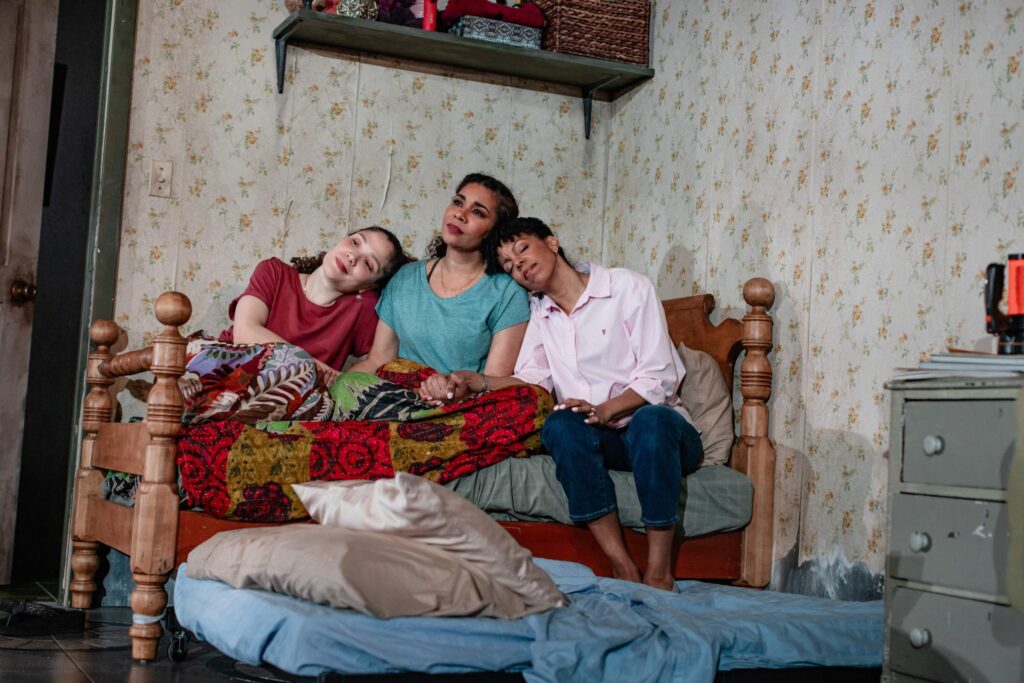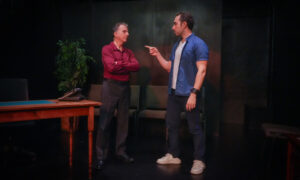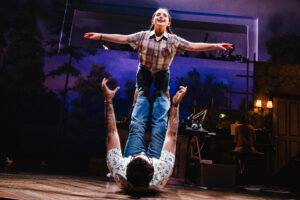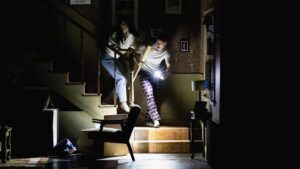Don’t Eat the Mangos is a dark, hilarious Puerto Rican take on an eerily familiar story.
You know, the story about three sisters. They’re stars in Orion’s Belt, characters in the folklore of multiple cultures, a well-known triad in literature. Think Alcott’s Little Women, Shakepeare’s King Lear, and (obviously) Chekhov’s The Three Sisters.
In the Huntington’s new production of Ricardo Pérez González’s play, they’re Ismelda (Jessica Pimentel), Yinoelle (Yesenia Iglesias), and Wicha (Evelyn Howe). Ismelda, the eldest and without mate or offspring, lives at home, caring for stroke-afflicted Papi (José Ramón Rosario) and going-through-cancer-treatment Mami (Susanna Guzmán). Pimentel’s Ismelda from the first minute carries herself as the ancient bearer of some mythical burden, a palpable maturity defining her despite the sisters’ raunchy, antic badinage. Yinoelle is on the cusp of a decision to leave Puerto Rico with her husband and children for a better life in the U.S., and Iglesias deftly embodies the jittery conflict between familial loyalty and hunger for a different life. Wicha, a teacher and sometime political activist, seems much younger than her sisters although she isn’t. She’s simply ignorant of the crushing secret underlying the family’s belief that the fruit of the towering mango tree outside the kitchen will cause rabies and can never be eaten, even in the past when the children had no other food. Howe’s Wicha is a flip, flaky innocent until her character is altered by a buried, brutish truth.
The sisters are deftly defined in Zoë Sundra’s costume designs, with Ismelda in dark pants and jacket, Yinoelle in a nervous black and white print, and Wicha in casual tees and shorts.
The action takes place in 2019 in El Comandante, a neighborhood in Carolina, Puerto Rico, just outside San Juan. Tanya Orellana’s realistic, rotating set of kitchen, Papi’s sick room and Ismelda’s bedroom, feels significantly small, as if the family is oddly compressed by it. Or perhaps the house itself is being suffocated in the shadow of the omnipresent mango tree and ground littered with forbidden fruit just beyond the kitchen. Enhancing the story’s athletically shifting moods, Jake Rodriguez’s original music between scene changes maintains audience connection to the action. And Cha See’s lighting, especially of Papi’s sick room and various foci on the mango tree, is effective.
Some dialogue is in Spanglish or Spanish, resulting on opening night with the usual parenthetical repeats in English being drowned out by the laughter and applause of enthusiastic Spanish speakers in the audience. That is, the monolingual English speaking audience was at times adrift amid the laughter. The sisters are savvy, streetwise, and as deft with variants of “fuck” as any longshoreman, and their personal insults alone are worth the price of a ticket.
The play is flat-out funny (until it isn’t) and the sisters completely relatable as they struggle with big political issues and smaller, typical familial problems like how to care for ailing parents. But playwright Pérez González in a conversation with Artistic Director Loretta Greco explained his use of humor in conjunction with the very dark revelations and action in the play. “That is a consummately Puerto Rican way of dealing with the universe,” he said “- to laugh in the face of tragedy.” Don’t Eat the Mangos isn’t a classic tragedy involving Aristotle’s “fall of a great man from high estate because of a flaw in his character,” but rather a tale of classic, universal awfulness in which Aristotle had no interest or knowledge. However, had his wife, Pythias, written a Poetics, this play would fall under the rubric of her definition of tragedy.
Let it suffice that no member of any audience for Don’t Eat the Mangos would casually, say, on a dare, step onto the stage and eat one of the real mangos on the floor beneath that prop tree. Their meaning is too abhorrent.
Written by Ricardo Pérez González. Directed by David Mendizábal. March 26 to April 27, The Huntington Calderwood Pavilion, Boston Center for the Arts, 527 Tremont Street, Boston, MA, 62116. One hour, 45 minutes, ticketing 617 266-0800.









